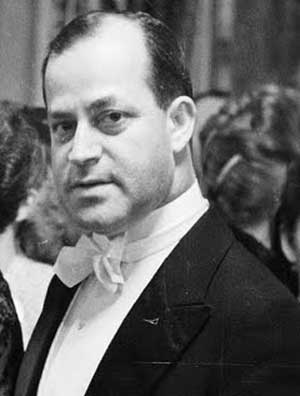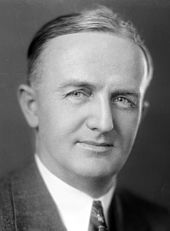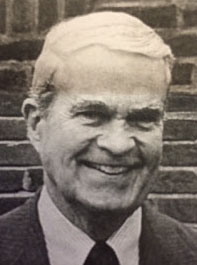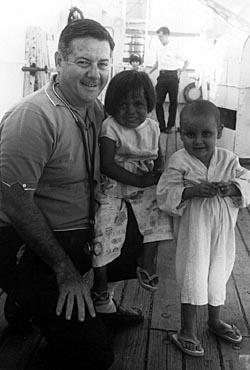The 1961 Awardees

Hon. Willard L. Beaulac
(1899-1990)
BSFS 1921, Honorary degree 1949Washington, DC
Willard Beaulac, who served as United States Ambassador to five different countries over his career as a foreign service officer, received the John Carroll Award in ceremonies held at the Colony Hotel in Cranston, RI on Sep. 30, 1961.
Born in Pawtucket, RI in 1899, Beaulac served in World War I before enrolling at the recently opened School of Foreign Service at Georgetown; he was in its inaugural graduating class in 1921 and is credited with being its first graduate. He joined the U.S. Foreign Service later that year, serving in a variety of consular positions in Latin America for over 20 years before his inaugural ambassadorial assignment, the US Ambassador to Paraguay, in 1944.
Following three years in Paraguay, additional ambassadorships followed in Colombia (1947-51), Cuba (1951-53), Chile (1953-56) and Argentina (1956-60). At the time of his award, Ambassador Beaulac taught at the National War College; in alter years, he would serve on the faculty at Ball State University and Southern Illinois University.
Beaulac died in 1990 at the age of 91.

Hon. Francis B. Condon
(1891-1965)
LLB 1916Providence, RI
Francis Condon, who served as a U.S. Congressman and the Chief Justice of the Supreme Court of Rhode Island, received the John Carroll Award in ceremonies held at the Colony Hotel in Cranston, RI on Sep. 30, 1961.
Born in Central Falls, RI, Condon received his law degree from Georgetown in 1916. Following military service, he served in the Rhode Island legislature from 1921-25 and the U.S. House of Representatives from 1931-1935. He resigned his House seat to become an associate justice of the Rhode Island Supreme Court from 1935 to 1958, and its chief justice from 1958 until his death in 1965 at the age of 74.
Rev. Frederick C. Hickey O.P.
(1904-1966)
BS 1926Providence, RI
Rev. Frederick Hickey, who served as a professor and administrator at Providence College for 29 years, received the John Carroll Award in ceremonies held at the Colony Hotel in Cranston, RI on Sep. 30, 1961.
Born in Detroit in 1904, Hickey came to Washington from the University of Detroit High School, a fellow Jesuit school. But it was the Dominicans, not the Jesuits, where Hickey turned, as he joined the order in 1926 and was ordained in 1933.
The Georgetown University Alumni Magazine recognized Rev. Hickey as follows: "A long time faculty member at Providence College where he has been successively Chairman of the Department of Chemistry, Head of the Department of Natural Sciences, Director of the Medical Research Laboratory, and most recently, Director of the Honors Science Program. He is also a member of the Rhode Island Atomic Energy Commission."
Hickey died suddenly on Christmas Day, 1966 while visiting his brother in Detroit. Rev. Hickey was eulogized by a member of the Dominican community as follows: "We have much to thank God for in the 62 years of Father Hickey's life...and much to learn from it too. The most significant lesson for those of us who follow in his footsteps is that it is possible to be a fully competent professional, an effective educator and administrator, a disciplined scientist, a monk and a priest, a sensitive and sophisticated human being and a devout Christian."

Daniel L. Schlafly
(1912-1997)
AB 1933St. Louis, MO
Daniel Schlafly, a St. Louis business executive and philanthropist, received the John Carroll Award in ceremonies held at the Colony Hotel in Cranston, RI on Sep. 30, 1961.
Schlafly was the third generation of a prominent St. Louis family who owned the Mountain Valley brand of mineral water, the nation's first mass-produced water brand. In addition to his executive duties with the family business, Schlafly became an indispensable civic and educational leader.
"When he was elected to the St. Louis Board of Education in 1953, mild-mannered Daniel L. Schlafly seemed an unlikely man for the job," wrote Time magazine. "Schlafly is a Roman Catholic who never attended a public school and never sent his three children to one. As it turned out, Schlafly has done more to clean up graft in public schools than anyone in the history of the city." He served 28 years on the board, as well as leading the board of directors at St. Louis University, the first layman ever elected to such a position at a major Catholic university.
"We knew him as "Mr. Schlafly." For truly there was not a St. Louisan who gave life to the word "gentleman" in the same way he did," wrote the St. Louis Post-Dispatch upon Daniel Schlafly's death in 1997 at the age of 86. "Along with his wife, Adelaide, Mr. Schlafly has been a quiet and persistent benefactor for the children of our city. His devotion to an integrated society where opportunity crosses all boundaries, religious, ethnic and geographic, was matched only by his dedication to his family and those he knew as friends...Mr. Schlafly gave quietly of his fortune and strongly of his intellect and energies. His death last week lessens all of our lives because his presence so enriched the entire community."

William B. Walsh, MD
(1920-1996)
MD 1943, Honorary degree 1962Bethesda, MD
Dr. William Walsh, whose commitment to the medical needs of the poor began a worldwide humanitarian effort, received the John Carroll Award in ceremonies held at the Colony Hotel in Cranston, RI on Sep. 30, 1961.
Walsh was born in new York and received his undergraduate degree from St. John's before enrolling at Georgetown for its accelerated medical studies at the onset of World War II. Following his studies at Georgetown, he was assigned to a naval destroyer in the Pacific Theater. Walsh not only saw the horrors of war first hand (being one of the first American soldiers entering Hiroshima after the atomic bomb) but the perilous health of peoples across the South Pacific.
Upon returning to Washington and teaching at the Georgetown Medical Center, Walsh began creating a plan to address this health crisis--he called it Project HOPE (Health Opportunities for People Everywhere). In 1958, he persuaded President Eisenhower to donate a retired Naval hospital ship, the USS Consolation, to this cause.
"The call was put out for American doctors, nurses and technologists to share their skills and knowledge with the people of developing nations - teaching while healing. For every American on board, there would be a counterpart to be trained," a history of the project recalled. Two years later, the S.S. HOPE sailed for the Pacific to international acclaim, with a documentary on the project winning the 1961 Academy Award. The S.S. HOPE sailed for 14 years across the globe, bringing medical care to hundreds of thousands of people. The group now provides land-based health care services for at-risk patients on five continents.
The author of four books about the project, Dr. Walsh received the Presidential Medal of Freedom by President Reagan in 1987, and died in 1996 at the age of 76.